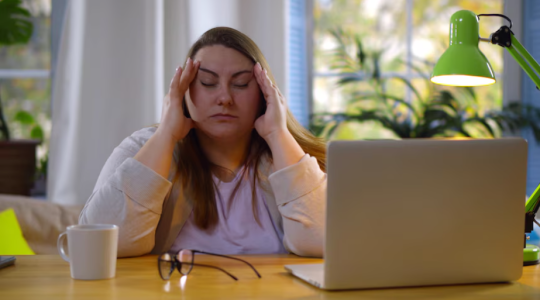What you can do when feeling overwhelmed
By
ABC News
- Replies 0
When we live in a society where productivity is constantly praised, it's no wonder we often ignore the signals that we're stretched too thin.
If you've been feeling numb, disconnected or foggy, you could be experiencing symptoms of overwhelm.
Clinical psychologist Rebecca Ray says it is one of the most common issues she sees in her clinical practice on the Sunshine Coast/Kabi Kabi land.
But it's not always obvious to those experiencing it, she told ABC Sunshine Coast Mornings.
"It's not necessarily an all or nothing response, where you're lying on the couch wrapped in a blanket," Dr Ray says.
"It's kind of like coping but with the handbrake on."
There are many life pressures that can lead us to feel overwhelmed; relationship difficulties, family breakdown, illness or injury, work pressures, parenting and financial difficulties, to name a few.
So, how do we recognise the signs of overwhelm? And how do we deal with it when we're at capacity?
Is it stress or overwhelm?
Stress and overwhelm are similar but distinct experiences.
Stress is the feeling of being under pressure, while overwhelm is the state of feeling burdened by too many thoughts, tasks, or emotions, leaving you feeling stuck or out of control.
That feeling of being stuck is what Dr Ray describes as a functional freeze response.
"That's the part of our brain that kicks into a survival mode that helps us to manage really stressful or intense situations," she says.
"[It's] your nervous system trying to protect you when you're in a state of overwhelm.
"You might still go to work, you might still parent your children or pay your bills, but you feel numb or disconnected or foggy."
Other symptoms include:
Over time, overwhelm may increase the risk of anxiety and depression, making it even more important to address early on.
Dr Ray says simply trying to be more organised is not the solution.
"[Don't] write yourself a to-do list as long as your arm," she says.
"Because in Western society … that operates at a very fast pace, we can [feel like] if we just do more, then we'll feel better.
"But sometimes it's important to decide 'what are the things I can actually take off my plate?'"
Written by Amy Sheehan, ABC News.
If you've been feeling numb, disconnected or foggy, you could be experiencing symptoms of overwhelm.
Clinical psychologist Rebecca Ray says it is one of the most common issues she sees in her clinical practice on the Sunshine Coast/Kabi Kabi land.
But it's not always obvious to those experiencing it, she told ABC Sunshine Coast Mornings.
"It's not necessarily an all or nothing response, where you're lying on the couch wrapped in a blanket," Dr Ray says.
"It's kind of like coping but with the handbrake on."
There are many life pressures that can lead us to feel overwhelmed; relationship difficulties, family breakdown, illness or injury, work pressures, parenting and financial difficulties, to name a few.
So, how do we recognise the signs of overwhelm? And how do we deal with it when we're at capacity?
Is it stress or overwhelm?
Stress and overwhelm are similar but distinct experiences.
Stress is the feeling of being under pressure, while overwhelm is the state of feeling burdened by too many thoughts, tasks, or emotions, leaving you feeling stuck or out of control.
That feeling of being stuck is what Dr Ray describes as a functional freeze response.
"That's the part of our brain that kicks into a survival mode that helps us to manage really stressful or intense situations," she says.
"[It's] your nervous system trying to protect you when you're in a state of overwhelm.
"You might still go to work, you might still parent your children or pay your bills, but you feel numb or disconnected or foggy."
Other symptoms include:
- Feeling irritable or frustrated
- Feeling helpless or hopeless
- Panic or anxiety
- Task avoidance
- Appetite changes
- Sleep disturbances
- Struggling to make decisions
Over time, overwhelm may increase the risk of anxiety and depression, making it even more important to address early on.
Dr Ray says simply trying to be more organised is not the solution.
"[Don't] write yourself a to-do list as long as your arm," she says.
"Because in Western society … that operates at a very fast pace, we can [feel like] if we just do more, then we'll feel better.
"But sometimes it's important to decide 'what are the things I can actually take off my plate?'"
Written by Amy Sheehan, ABC News.









